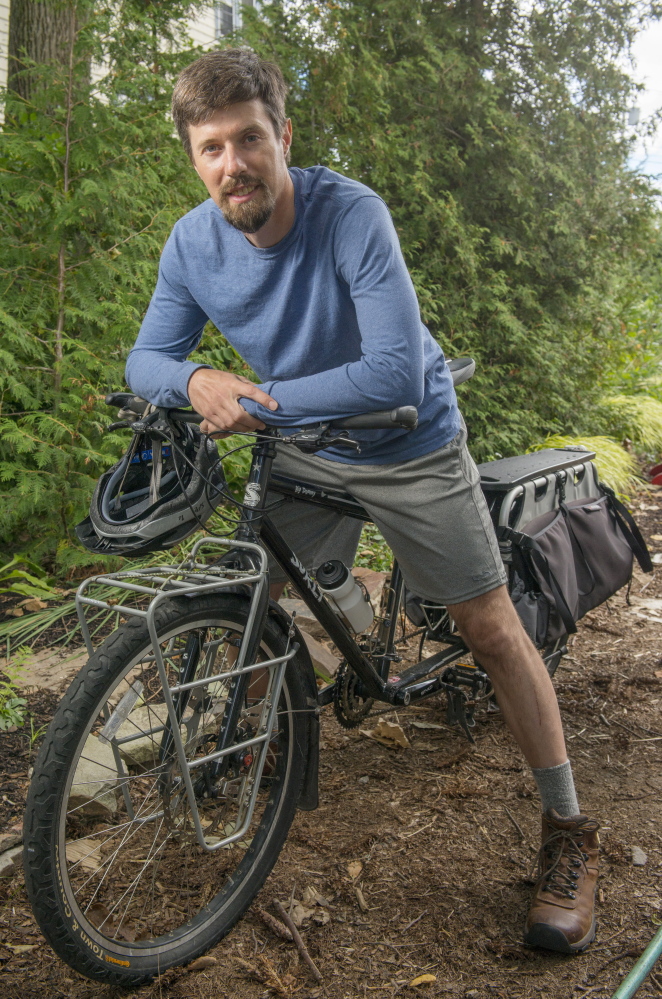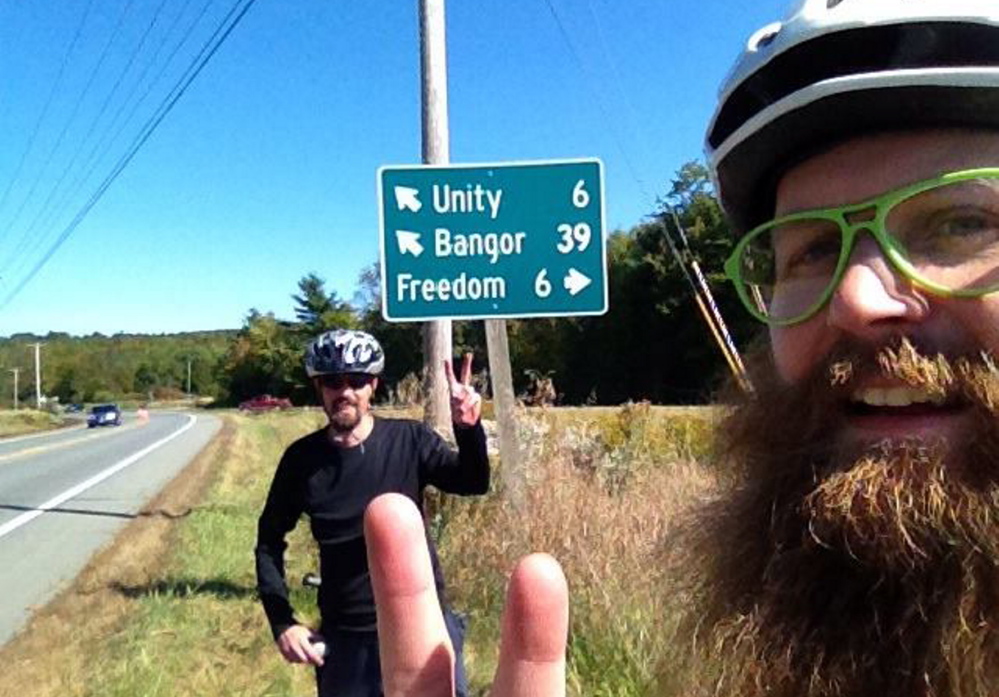One thing Fred Horch will not do on his way to this year’s Common Ground Country Fair is sit in traffic. However, he will be sitting and he will be on the road.
He’s one of the organizers of the 2015 Climate Ride to Common Ground, a roughly 100-mile journey from the steps of Portland City Hall to the fairground in Unity. This is the second year in a row Horch will undertake the ride, and he’d like some company. Or at minimum, to inspire others to ditch Maine’s most legendary traffic jams while enjoying the sights and burning no fossil fuels.
We called him up to talk about how fit you have to be to ride 100 miles in two days and how realistic it is to expect others to do the same. (His answers will surprise you.)
INSTIGATORS: Did you dream up this madness in 2014? “It was Asher Platts’ idea. He was chair of the Green Party, and we were both running for office (for seats in the state Senate) as independent candidates.” It seemed like a good way to promote both their candidacies, while fulfilling Horch’s longtime goal of biking to Common Ground.
Horch used to own a sustainable living store in Brunswick, he had organized a Climate Solutions Expo and Summit in Augusta earlier in 2014, and he, like everyone who has ever gone to the Maine Organic Farmers and Gardeners Association’s biggest annual event, is well aware that traffic to and from the fair is a problem. “The situation up there is crazy.”
PHYSICAL FITNESS: Horch does not pretend to be Lance Armstrong. “I am completely out of shape. I don’t even have a bike.” He said he almost drove poor Platts crazy last year because he moved so slowly, pausing regularly to stretch (smart).
He borrows a bike from a friend, with cargo-carrying capacity for tent, sleeping bag, etc., this being a multi-day event. The bike “is big and slow. This is not Lycra and Spandex and impressing people with your bike.” But he hopes it looks intriguing to anyone who spots him or other riders on the road. Or the flags they plan to put up at meet-up spots along the route, like the train station in Brunswick or the capitol steps in Augusta, to entice participants.
UNIFIED IN UNITY: Last year, he and Platts stopped at a friend’s house in Augusta and spent the night. They’re hoping to get a permit to camp in one of the city’s parks this year, to make the ride more of a public political event. But once the wheels are moving, it’s likely to be less about politics than the pleasure of a new perspective. “We go up 201, just go right through Gardiner and Hallowell,” Horch said.
Just thinking about all these miles prompts us to ask, does one feel at least a little like Lance Armstrong after such a journey? He laughed. “It is not about getting buff and strong and losing weight,” he said. “But to be seeing Maine – it is such a beautiful state and when you are bicycling a long way you see so many different things than you would if you were on the freeway.”
The second night he’ll stop at a campground in Unity and hopes to pick up more riders on the Unity College campus to ride the last few miles to the fairground as the gates open.
ON THE GROUND: “To arrive under your own power … I enjoyed the fair so much more last year because, just showing up, I felt a sense of accomplishment.” And validation. “There are these people that treat you like a hero.” Plus bonuses: “And you get a discount to get in.”
He’s hoping that participants will do as he is doing and help with the educational component of the recycling and composting stations around the fair, showing fairgoers exactly which of the many bins to dispose of their waste in. “You can help eliminate pollution once you are there, too.”
But the best part might be the feeling that instead of bemoaning climate change, he was doing something. Even a little something. “It actually is better getting there without fossil fuels,” he said. “Certainly the parking would be better if everybody biked.”
DON QUIXOTE? Not that Horch expects every Mainer who wants to go to the fair to travel there by bicycle. For most that would be a highly impractical endeavor. (Horch runs a business called Spark Applied Efficiencies with Pat Coon, one of the cofounders of ReVision, to help businesses find greater energy efficiency. Being his own boss, he can get away. Platts might not be able to.) But, please don’t think of him as Don Quixote. “You could definitely write this off as crazy and insignificant and stupid, but I hope it leads to some awareness.”
The current alternatives to driving the whole way to the fairgrounds in Unity include taking a train ride the last few miles to the fair – which is fun but typically involves a lot of driving just to get to either of the two train stops – or a ride share system, which Horch politely describes as “not done very well.” Not that he’s casting aspersions on Common Ground or MOFGA. “I am just delighted that they are able to put on a wonderful fair every year. It is not easy what they do.”
SYMBOLISM: His ride, no matter how fun and fossil-fuel free, is not the big answer. “This is not going to solve the problem,” he said. Horch sees the bike ride more as a means to shift minds from the problem state to the solution state. “We are trying to inspire people to do something. Then, next year, we are hoping to get some critical mass together to talk about longer term solutions.” Like buses that run frequently – and cheaply – from hubs like Portland, where a lot of fairgoers would be likely to assemble.
FOUR-WHEEL DRIVE: Lest you think Horch is opposed to anything with four wheels, know that he does have a car. An electric one. Which he fuels from the solar panels on his roof at his home in Brunswick. “I made the power that is going into this car. It is like a miracle of modern technology.”
Send questions/comments to the editors.





Comments are no longer available on this story